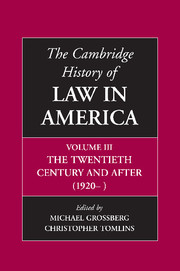Book contents
- Frontmatter
- 1 Law and the State, 1920–2000: Institutional Growth and Structural Change
- 2 Legal Theory And Legal Education, 1920–2000
- 3 The American Legal Profession, 1870–2000
- 4 The Courts, Federalism, and The Federal Constitution, 1920–2000
- 5 The Litigation Revolution
- 6 Criminal Justice in the United States
- 7 Law and Medicine
- 8 The Great Depression and the New Deal
- 9 Labor’s Welfare State: Defining Workers, Constructing Citizens
- 10 Poverty law and income Support: From the Progressive Era to the War on Welfare
- 11 The Rights Revolution in the Twentieth Century
- 12 Race and Rights
- 13 Heterosexuality as a Legal Regime
- 14 Law and the Environment
- 15 Agriculture and the State, 1789–2000
- 16 Law and Economic Change During the Short Twentieth Century
- 17 The Corporate Economy: Ideologies of Regulation and Antitrust, 1920–2000
- 18 Law and Commercial Popular Culture in the Twentieth-Century United States
- 19 Making Law, Making War, Making America
- 20 Law, Lawyers, and Empire
- Bibliographic Essays
- Notes on Contributors
- Index
Bibliographic Essays
Published online by Cambridge University Press: 28 November 2008
- Frontmatter
- 1 Law and the State, 1920–2000: Institutional Growth and Structural Change
- 2 Legal Theory And Legal Education, 1920–2000
- 3 The American Legal Profession, 1870–2000
- 4 The Courts, Federalism, and The Federal Constitution, 1920–2000
- 5 The Litigation Revolution
- 6 Criminal Justice in the United States
- 7 Law and Medicine
- 8 The Great Depression and the New Deal
- 9 Labor’s Welfare State: Defining Workers, Constructing Citizens
- 10 Poverty law and income Support: From the Progressive Era to the War on Welfare
- 11 The Rights Revolution in the Twentieth Century
- 12 Race and Rights
- 13 Heterosexuality as a Legal Regime
- 14 Law and the Environment
- 15 Agriculture and the State, 1789–2000
- 16 Law and Economic Change During the Short Twentieth Century
- 17 The Corporate Economy: Ideologies of Regulation and Antitrust, 1920–2000
- 18 Law and Commercial Popular Culture in the Twentieth-Century United States
- 19 Making Law, Making War, Making America
- 20 Law, Lawyers, and Empire
- Bibliographic Essays
- Notes on Contributors
- Index
Summary
LAW AND THE STATE, 1920–2000
I borrow the concept of a political regime from Karen Orren and Stephen Skowronek, “Regimes and Regime Building in American Government,” Political Science Quarterly 113 (1998–99), 689–702 and my understanding of state capacity and state autonomy from Daniel P. Carpenter, The Forging of Bureaucratic Autonomy (Princeton, NJ, 2001).
William J. Novak, The People’s Welfare (Chapel Hill, NC, 1996); Morton Keller, Affairs of State (Cambridge, MA, 1977); and Stephen Skowronek, Building a New American State (New York, 1982) are essential readings on the nineteenth-century origins of administration in the United States. Thomas K. McCraw, “Regulation in America: A Review Essay,” Business History Review 49 (1975), 159–83 and Robert L. Rabin, “Federal Regulation in Historical Perspective,” Stanford Law Review 38 (1986): 1189–326 provide valuable overviews of command-and-control regulation in the late nineteenth and twentieth centuries.
Morton Keller’s Regulating a New Economy (Cambridge, MA, 1990) and Regulating a New Society (Cambridge, MA, 1994) are indispensable guides to the American state from 1900 to 1933. Barry D. Karl, The Uneasy State (Chicago, 1983), an interpretive synthesis for the years 1915 to 1945, emphasizes the continuing force of localism in the twentieth-century state. John Teaford, The Rise of the States (Baltimore, 2002) is an excellent study of state governments from the 1890s through the 1980s.
- Type
- Chapter
- Information
- The Cambridge History of Law in America , pp. 759 - 902Publisher: Cambridge University PressPrint publication year: 2008



